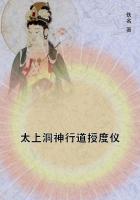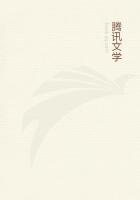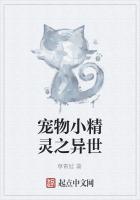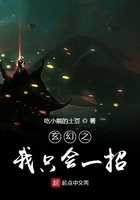"The shape of this house is quaint--it is even laughable. But there is nothing wrong about it."As they spoke they came round the curve of glass that ended the conservatory, an uninterrupted curve, for there was neither door nor window by which to enter at that end. The glass, however, was clear, and the sun still bright, though beginning to set; and they could see not only the flamboyant blossoms inside, but the frail figure of the poet in a brown velvet coat lying languidly on the sofa, having, apparently, fallen half asleep over a book. He was a pale, slight man, with loose, chestnut hair and a fringe of beard that was the paradox of his face, for the beard made him look less manly. These traits were well known to all three of them; but even had it not been so, it may be doubted whether they would have looked at Quinton just then. Their eyes were riveted on another object.
Exactly in their path, immediately outside the round end of the glass building, was standing a tall man, whose drapery fell to his feet in faultless white, and whose bare, brown skull, face, and neck gleamed in the setting sun like splendid bronze. He was looking through the glass at the sleeper, and he was more motionless than a mountain.
"Who is that?" cried Father Brown, stepping back with a hissing intake of his breath.
"Oh, it is only that Hindoo humbug," growled Harris; "but Idon't know what the deuce he's doing here."
"It looks like hypnotism," said Flambeau, biting his black moustache.
"Why are you unmedical fellows always talking bosh about hypnotism?" cried the doctor. "It looks a deal more like burglary.""Well, we will speak to it, at any rate," said Flambeau, who was always for action. One long stride took him to the place where the Indian stood. Bowing from his great height, which overtopped even the Oriental's, he said with placid impudence:
"Good evening, sir. Do you want anything?"
Quite slowly, like a great ship turning into a harbour, the great yellow face turned, and looked at last over its white shoulder. They were startled to see that its yellow eyelids were quite sealed, as in sleep. "Thank you," said the face in excellent English. "I want nothing." Then, half opening the lids, so as to show a slit of opalescent eyeball, he repeated, "Iwant nothing." Then he opened his eyes wide with a startling stare, said, "I want nothing," and went rustling away into the rapidly darkening garden.
"The Christian is more modest," muttered Father Brown; "he wants something.""What on earth was he doing?" asked Flambeau, knitting his black brows and lowering his voice.
"I should like to talk to you later," said Father Brown.
The sunlight was still a reality, but it was the red light of evening, and the bulk of the garden trees and bushes grew blacker and blacker against it. They turned round the end of the conservatory, and walked in silence down the other side to get round to the front door. As they went they seemed to wake something, as one startles a bird, in the deeper corner between the study and the main building; and again they saw the white-robed fakir slide out of the shadow, and slip round towards the front door. To their surprise, however, he had not been alone. They found themselves abruptly pulled up and forced to banish their bewilderment by the appearance of Mrs. Quinton, with her heavy golden hair and square pale face, advancing on them out of the twilight. She looked a little stern, but was entirely courteous.
"Good evening, Dr. Harris," was all she said.
"Good evening, Mrs. Quinton," said the little doctor heartily.
"I am just going to give your husband his sleeping draught.""Yes," she said in a clear voice. "I think it is quite time."And she smiled at them, and went sweeping into the house.
"That woman's over-driven," said Father Brown; "that's the kind of woman that does her duty for twenty years, and then does something dreadful."The little doctor looked at him for the first time with an eye of interest. "Did you ever study medicine?" he asked.
"You have to know something of the mind as well as the body,"answered the priest; "we have to know something of the body as well as the mind.""Well," said the doctor, "I think I'll go and give Quinton his stuff."They had turned the corner of the front facade, and were approaching the front doorway. As they turned into it they saw the man in the white robe for the third time. He came so straight towards the front door that it seemed quite incredible that he had not just come out of the study opposite to it. Yet they knew that the study door was locked.
Father Brown and Flambeau, however, kept this weird contradiction to themselves, and Dr. Harris was not a man to waste his thoughts on the impossible. He permitted the omnipresent Asiatic to make his exit, and then stepped briskly into the hall. There he found a figure which he had already forgotten. The inane Atkinson was still hanging about, humming and poking things with his knobby cane. The doctor's face had a spasm of disgust and decision, and he whispered rapidly to his companion: "I must lock the door again, or this rat will get in.
But I shall be out again in two minutes."
He rapidly unlocked the door and locked it again behind him, just balking a blundering charge from the young man in the billycock. The young man threw himself impatiently on a hall chair. Flambeau looked at a Persian illumination on the wall;Father Brown, who seemed in a sort of daze, dully eyed the door.
In about four minutes the door was opened again. Atkinson was quicker this time. He sprang forward, held the door open for an instant, and called out: "Oh, I say, Quinton, I want--"From the other end of the study came the clear voice of Quinton, in something between a yawn and a yell of weary laughter.
"Oh, I know what you want. Take it, and leave me in peace.
I'm writing a song about peacocks."
Before the door closed half a sovereign came flying through the aperture; and Atkinson, stumbling forward, caught it with singular dexterity.

